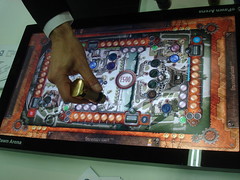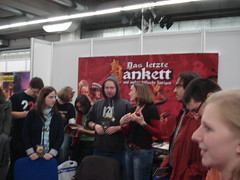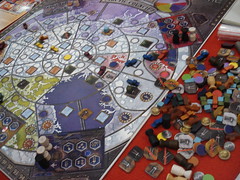Today it was our own fault the day was short – we got up late to go to the fair and then left early because of a shared headache. But playing games was all but impossible, anyway. The crowds were pushing through the corridors with a pressure more commonly associated with Earth’s core. It was impossible to stop anywhere. Paradoxically, it was also impossible to go anywhere, as if the crowds were moving and not moving at the same time. The joys of Essen on Saturday.

We did manage a few stops between being pushed around, special offer shopping and leaving early. The first was of a technological nature: ePawn, the manufacturer of the ePawn Arena, who can be found at FunForge’s booth (9-38) because of their current cooperation. The Arena wants to be the game board of the future: a screen that runs games from your iThing (for now) but doesn’t take the fun of moving real meeple around: the device recognises game pieces set on top of it. Many boardgamers – myself included – will be resistant to the idea of giving up the good old game board, but the electronic board opens new possibilities to explore. The success of ePawn will depend on the quality and innovation of the applications.

The currents then took us to GameHeads (9-11) and from there the only game I managed to play for the day. At GameHeads’ own booth, we followed a quick explanation of Derringer, a family friendly poker game with meta-cards: each card in Derringer shows one or more traditional poker cards from which you assemble traditional poker hands and sometimes shoot other players with a derringer card. Derringer looks great but didn’t really click with me – can’t like them all, right? The big attraction was the Das Letzte Bankett (The Last Banquet) demo game that had to happen at the Heidelbear booth because of the space required. With their coming release, GameHeads intends to entertain large groups (up to 25 players) in a light, quick and above all entertaining game. We played the Last Banquet scenario from the game, but there will be a total of four in the finished game that may use slightly different rules than the ones used here. In the Last Banquet, two factions both want to rid the country of the old king – but each insists that they must do the deed. In game terms: the faction that kills the king wins. Or the king wins when he’s still alive after three rounds. To start with, each player chooses a faction and is dealt an unique character card with two to four abilities. Both factions then elect their assassins and all players stand behind their chair in random order. The king starts passing the sceptre around, and each player who receives it may use one of his abilities: almost all of them rearrange player’s position in some way. After taking his or her action, the player sits and cannot receive the sceptre again. The goal is to have your faction’s assassin sitting next to the king at the end of the round with the other faction’s killer safely out of reach. The mechanics may sound banal, but the diverse character abilities, the constant movement and the fact that you can’t talk strategy with your co-conspirators once the game has started make this a very good time, easily on par with or surpassing the various werewolf variants for me. A big thank you to our two game explanators that did a great job despite the tight space and high level of background noise.

The only other big stop we managed was to get an explanation of 2019: The Arctic from the game’s creator Andrzej Kurek. Of the games we saw at Essen, 2019 is at the deep end of the pool, at least as complex as yesterday’s Fief if not more so – it’s hard to tell since we didn’t have the two hours plus to play it. 2019: The Arctic deals with the conflict about natural resources beyond the Arctic circle that six different nations / unions of nations wish to exploit. However, it doesn’t do so in the form of a war game. The base mechanic for the game is worker placement: you send your lobbyists to control the nations actions, and when the stars are right you build oil platforms and hope they won’t be destroyed. There is many different options to take influence and I’m sure it will take a couple of games to figure out how to get what we want.
2019 was our last major stop for the day and for this year’s fair – we won’t be in Essen tomorrow as we’re pretty tired at this point and still suffer from our headaches. A great, big thank you to all the fantastic people that took the time to talk to us, explain their games and play. An even bigger apology to everyone that was hoping to see us but didn’t. We were trying hard to meet everyone, but we kept missing some people every time we tried. You guys all rock, I hope you had – or are still having – a successful fair.
At this point, I believe it’s traditional to draw a short conclusion of the fair. My first conclusion would be that all the people saying there’s nothing new in boardgames any more are plain wrong. In just three days at Essen, we managed to see innovation in all areas of gaming, from party games through light card games all the way to heavy strategy, and everyone is still talking about their new ideas, so there’s no need to worry about a lack of games to play any time soon. My second conclusion is that innovation has to be created by the game authors, but the publishers need the courage to put innovative games out there. German game publishers have been complaining about reduced sales this year so far – I hope you’ll forgive me for not having a source handy for that right now. Obviously I don’t know any visitor or sales numbers for the fair yet, but many innovative games were sold out on Friday or even in the preorders while representatives from German publishers say “We’re not so interested, it doesn’t match our target demographic” – a phrase that I heard a few times from different publishers about different games. I don’t want to tell anyone their business, but maybe there’s a relation between those two things. What I saw this year is that Germany still is an important country for boardgames, but more publishers and designers from all over the world are joining the fun every year: there was more East European publishers this year than ever before. More Russians, too. For the first time, I was aware of the presence of games by South American publishers at the fair. And all of them bring their own style, their own new ideas. I’m sure we’ll be seeing even more newcomers with even more new, interesting ideas in the coming years, and as a resident here I’d hate for the Germans to miss all that.

